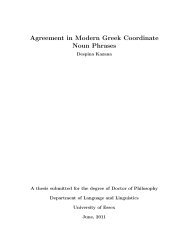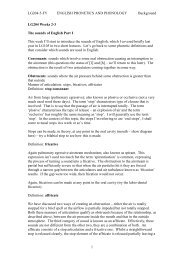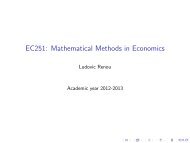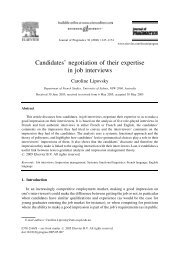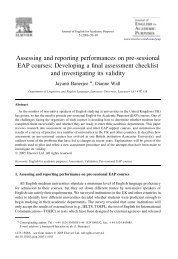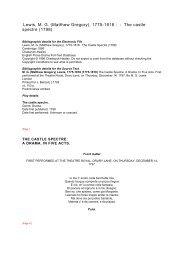Assuring the Empire of the Future: The 1798 Fete de la Liberte
Assuring the Empire of the Future: The 1798 Fete de la Liberte
Assuring the Empire of the Future: The 1798 Fete de la Liberte
You also want an ePaper? Increase the reach of your titles
YUMPU automatically turns print PDFs into web optimized ePapers that Google loves.
<strong>Assuring</strong> <strong>the</strong> <strong>Empire</strong> <strong>of</strong> <strong>the</strong> <strong>Future</strong>:<br />
<strong>The</strong> <strong>1798</strong> <strong>Fete</strong> <strong>de</strong> <strong>la</strong> <strong>Liberte</strong><br />
By Patricia Mainardi<br />
hen <strong>the</strong> procession <strong>of</strong> <strong>the</strong> <strong>Fete</strong> <strong>de</strong><br />
<strong>la</strong> <strong>Liberte</strong> bearing Napoleon's art<br />
loot from Italy crossed Paris on a rainy<br />
day in July <strong>1798</strong>, its passage was accom-<br />
panied by a song whose refrain went<br />
"Rome is no more in Rome. It is now in<br />
Paris"' (Fig. 1). But Rome in fact was<br />
two cities, cultural Rome and political<br />
Rome. Cultural Rome was <strong>the</strong> Mecca<br />
for young French artists and <strong>the</strong> home-<br />
away-from-home <strong>of</strong> <strong>the</strong> French Aca<strong>de</strong>-<br />
my; it was <strong>the</strong> <strong>de</strong>stination <strong>of</strong> young<br />
gentlemen on <strong>the</strong>ir grand tour and <strong>the</strong><br />
location <strong>of</strong> <strong>the</strong> most esteemed works <strong>of</strong><br />
art in <strong>the</strong> Western world-namely, <strong>the</strong><br />
sculpture <strong>of</strong> antiquity. But <strong>the</strong>re was a<br />
political Rome as well, <strong>the</strong> historical<br />
Rome <strong>of</strong> <strong>Empire</strong>, <strong>of</strong> marching armies<br />
and world conquest. Which <strong>of</strong> <strong>the</strong>se two<br />
Romes did <strong>the</strong> festival honor, and which<br />
was now in Paris?<br />
Art historians have looked at c<strong>la</strong>ssical<br />
art aes<strong>the</strong>tically and in<strong>de</strong>ed have writ-<br />
ten about this festival as a celebration <strong>of</strong><br />
"taste and <strong>the</strong> antique."2 Historians, on<br />
<strong>the</strong> o<strong>the</strong>r hand, have viewed it politically<br />
and have regar<strong>de</strong>d <strong>the</strong> art primarily as<br />
war trophies.3 Both views are correct,<br />
for <strong>the</strong> art did embody a double authori-<br />
ty, both cultural and political; through<br />
<strong>the</strong> agency <strong>of</strong> <strong>the</strong>se objects both Romes<br />
were symbolically relocated in Paris. It<br />
is my <strong>the</strong>ory that <strong>the</strong> <strong>Fete</strong> celebrated<br />
this alliance between politics and<br />
antique art and that it symbolically<br />
marked <strong>the</strong> transfer <strong>of</strong> <strong>the</strong> cultural capi-<br />
tal <strong>of</strong> Europe from eighteenth-century<br />
Rome to nineteenth-century Paris. His-<br />
torians, while accepting that such a cul-<br />
tural relocation took p<strong>la</strong>ce, have been<br />
silent on <strong>the</strong> reasons; I am proposing<br />
that we look for an exp<strong>la</strong>nation in <strong>the</strong><br />
expressed French intention <strong>of</strong> affecting<br />
this transfer through <strong>the</strong> looting carried<br />
out by <strong>the</strong> Revolutionary armies<br />
throughout Europe and <strong>the</strong> subsequent<br />
disp<strong>la</strong>y <strong>of</strong> <strong>the</strong> plun<strong>de</strong>r in <strong>the</strong> Louvre. We<br />
have in recent history witnessed a simi-<br />
<strong>la</strong>r attempt by Hitler, whose p<strong>la</strong>ns for a<br />
grand cultural capital in Linz, his home-<br />
town in Austria, featured a museum<br />
stocked with all <strong>the</strong> looted art treasures<br />
<strong>of</strong> Europe.4 For Hitler, as for Napoleon<br />
before him, possession <strong>of</strong> <strong>the</strong> world's art<br />
treasures would legitimize his regime<br />
and constitute <strong>the</strong> outward sign <strong>of</strong><br />
<strong>Empire</strong>.<br />
Although looting had been a standard<br />
part <strong>of</strong> military conquest from time<br />
immemorial, it was brought to a new<br />
level <strong>of</strong> sophistication during <strong>the</strong> Revo-<br />
lutionary period. French looting <strong>of</strong> for-<br />
eign, as well as domestic, art treasures<br />
prece<strong>de</strong>d Bonaparte's rise to power;<br />
practiced as a kind <strong>of</strong> free enterprise by<br />
<strong>the</strong> military, it had accompanied <strong>the</strong><br />
first French campaign in Belgium in<br />
1793.5 In 1794, however, <strong>the</strong> Committee<br />
<strong>of</strong> Public Instruction <strong>de</strong>creed that "its<br />
Presi<strong>de</strong>nt will write to <strong>the</strong> Committee <strong>of</strong><br />
Public Safety on <strong>the</strong> importance <strong>of</strong><br />
secretly sending artists and scho<strong>la</strong>rs in<br />
<strong>the</strong> wake <strong>of</strong> our armies; in regions<br />
secured by Republican troops <strong>the</strong>y will<br />
appropriate, with precaution, monu-<br />
ments <strong>of</strong> interest to <strong>the</strong> arts and sciences<br />
and have <strong>the</strong>m sent to France."6 This<br />
was soon done, and a steady stream <strong>of</strong><br />
Rubenses and Van Dykes began arriv-<br />
ing in Paris.7 Despite some new rhetoric<br />
about such works being "liberated" not<br />
stolen, <strong>the</strong> legality <strong>of</strong> this procedure<br />
<strong>de</strong>pen<strong>de</strong>d on <strong>the</strong> right <strong>of</strong> conquest alone.<br />
Had <strong>the</strong> Belgians been able to <strong>de</strong>feat<br />
France, <strong>the</strong>y, according to military pre-<br />
ce<strong>de</strong>nt, would <strong>the</strong>n have had <strong>the</strong> right to<br />
recuperate <strong>the</strong>ir stolen treasures; this<br />
Fig. 1 <strong>Fete</strong> <strong>de</strong> <strong>la</strong> <strong>Liberte</strong>, 9-10 <strong>The</strong>rmidor VI, Champ-<strong>de</strong>-Mars, Paris.<br />
Summer 1989 155




